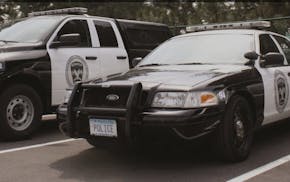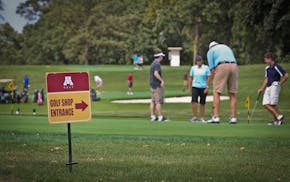RED LAKE, MINN. – Fourth-grader Jaxon Prentice, sitting on a couch in the radio station studio, hides his smile behind a pillow on his lap when he hears his voice first hit the airwaves.
"You're listening to 105.3 Red Lake Nation Radio," he hears himself say.
But first, he says it in Ojibwe.
Gibizindaan (you are listening to) ingodwaak (one hundred) naanan (five) dookibii'igan (period) niswi (three) miskwaagamiiwi-zaaga'igani (Red Lake Nation) bizindamowin (radio).
Jaxon and his fellow students at Red Lake Elementary School greeted radio listeners across the region in Ojibwe throughout December. The 30 fourth- and fifth-graders in his Ojibwe language cohort are learning the same curriculum as students at Red Lake Nation College.
"Since Ojibwe is a language with not that much fluent speakers, we're trying to teach the kids Ojibwe so the Ojibwe doesn't die off," Jaxon said. "So it's special to learn it because we're saving the language from extinction."
He agrees that they're kind of like superheroes in a way. But when asked how it feels to be only 10 and learning college material, he's fluent in humility.
"I think it's pretty cool, but I don't want to be like bragging or anything," he said. "So I only said that I'm doing college Ojibwe once at my house, so I don't repeatedly say it like I'm bragging."
His classroom is chock-full of Ojibwe books and posters. Phrases in Ojibwe are written across the whiteboard. Students take turns reading pages of text in Ojibwe.
Serena Graves-Daniel, 30, started teaching last January at the same elementary school she attended after earning her masters from St. Cloud State and graduating with a degree in Indigenous studies and a minor in Ojibwe language from Bemidji State University. She's a second-language learner who continues learning more about the language as she teaches it to her fourth- and fifth-grade students in the cohort.
"They came in with a love for the language," she said. "What I was able to do was just help them find a deeper love for it through the content we do in this class. But I didn't give them a magic wand and tell them to love doing advanced Ojibwe at 9 years old or anything."
She remembers as a kid learning numbers, colors and animals in Ojibwe, but not reading or speaking in full sentences or understanding grammar patterns and vocabulary like her students are already able to do.
"Last year, it was like boot camp getting ready for this year," said Graves-Daniel, whose students call her Bimwewe, an abbreviation of her Ojibwe name. "I was with them for a full academic year prior to this, so a really big part of their language journey was teaching them how to read in Ojibwe and just cementing the Ojibwe literacy."
Ojibwe language is typically taught in immersion schools. Some public schools have immersion programs, but Graves-Daniel said she didn't have advanced curriculum to turn to for her students who had already mastered the basics.
_____
To get more news from Brainerd, Bemidji and beyond, sign up for the free Lakes Country newsletter.
_____
Her husband, John Daniel, is an adjunct professor at the college in Red Lake teaching Ojibwe language. He told his students this fall that elementary students were learning their coursework.
"They were like, 'Wow, that's so cool.' I said, 'Yeah, go talk to them,'" Daniel said. "Because some of them have jobs where they can interact with the kids. And one girl said she actually went and talked to one, and they talked back in Ojibwe."
Daniel makes his own lesson plans, writes books for young Ojibwe learners and works as an independent contractor on language and immersion curriculum design. Daniel-Graves thought her students would be receptive to the college material. She tailors it to their socio-emotional needs, giving them "nibbles" and "not forcing mastery within a certain time frame, and just letting them go at their own pace."
She works with teacher Wesley Jourdain, whom the kids call Mr. Wes as he walks down the bustling halls. He started building the language foundation for students in kindergarten, first and second grades.
Jourdain said when they reached out to other school districts in the area, none had the lesson plans they needed.
"You know, maybe Red Lake is the fire-starter for getting curriculum on the ground for other schools, maybe to motivate them to do that," he said.
He runs a segment at the radio station, Connecting the Ojibwe Language. He and Daniel-Graves thought it would be fun for the students — and the community — to hear their accomplishments on the radio. Each student is given a day for their recorded Ojibwe phrase to play several times throughout the day. The project started Dec. 2 and runs through Dec. 31.
Cyrill Stillday, 11, said he was "a little bit nervous and a little bit excited" to hear himself on the radio.
Bimwewe's class is challenging, he said, but important "so that we can save the language."
"Last year was easier, but this year it's harder because we're reading Ojibwe sentences," Stillday said.
Radio station manager Gary "RezDawg" Jourdain Jr. said ever since Red Lake's first radio station started in 2022, he's always wanted to have students involved.
"This is really exciting," he said. "Now that it's starting here, we can just go up from here."
Revitalization
Ojibwe is considered an endangered language.
Bemidji State Ojibwe language professor and author Anton Treuer said nobody knows exactly how many first-language Ojibwe speakers there are because some tribes do an infrequent language census and some do none, and the government doesn't solicit or report this data.
There are an estimated 600,000 Ojibwe people, and Treuer says fewer than 10,000 speak Ojibwe; most of them live in Canada. In the U.S., he estimates there are fewer than 100 speakers.
Looking across northern Minnesota, Daniel said there are 20 first-language speakers in Red Lake, fewer than 10 in Leech Lake, and none in White Earth. He said there are 20 second-language learners in the area.
"That's less than 1 percent of Ojibwe people in our area that speak their own language," Daniel said. So when it comes to their students, he tells them, "This is real. We need you, guys."
First-language Ojibwe speakers are becoming exceedingly rare as elders die. Many never became fluent because of colonialism and being forced into boarding schools and forbidden to speak the language.
"When a first-language speaker has passed, we will pause and talk about it like, 'What does it mean? What do we do? How much more important is this now that we know this person has passed on?'" Graves-Daniel said. "And those might not be like typical questions you ask children, but in the world of a language not being spoken everywhere … those are super important conversations to have."
She gets one more year of teaching fourth-grade students, but her fifth-graders will move on to middle school. She constantly asks herself if she's given them enough tools to carry on what she taught them.
"How do I get them to be able to talk about and advocate for the Ojibwe language when Bimwewe is not their Ojibwe teacher anymore?" she said.
She and her husband hope to continue their advocacy in the classroom and through their nonprofit, Nisookamig, which offers services and support for Ojibwe language learners.
Scroll on social media today, and it's common to see a new generation teaching Ojibwe phrases and a word of the day on social media. It's part of the revitalization of the language. Jourdain hopes that students share their knowledge and passion for the language on TikTok or other platforms beyond the classroom.
Treuer said in an email to the Star Tribune that what Graves-Daniel is doing with her students is an inspiration.
"For years now she has dedicated herself to the study and teaching of our language," he said. "To see the young people she is working with at Red Lake blossoming in our language is a true testament to her remarkable efforts."
While there is a shrinking number of first-language speakers, there is a growing number of second-language learners, Treuer said, estimating the number around 200.
And counting.
Young Jaxon's love for Ojibwe has led him to discovering his inner linguist. He's learning Spanish and Japanese and dabbling in Korean. His grandmother gave him the Rosetta Stone app, making a library of languages — including Ojibwe — available on his tablet.
In return, he said he's teaching his grandma some Ojibwe.

Four arrested, no one injured in fighting and shooting following Burnsville High School graduation

One man dead in shooting Friday outside Northtown Mall in Blaine

University of Minnesota is putting its golf course up for sale
Supreme Court allows DOGE team to access Social Security systems with data on millions of Americans

